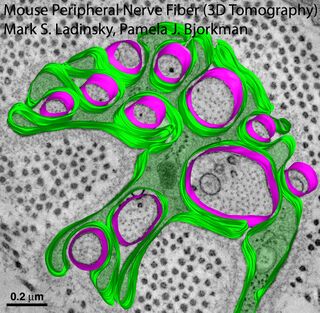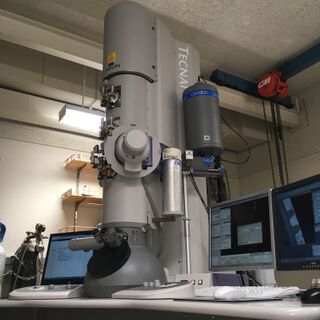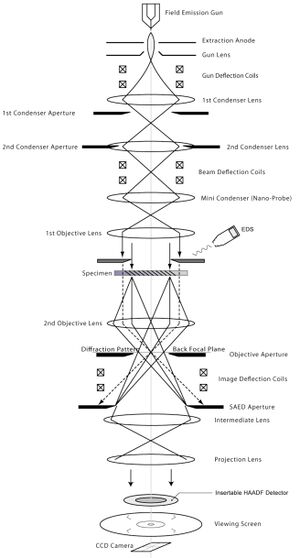Tecnai TF-30: 300 kV TEM, STEM, EDS & HAADF: Difference between revisions
Jump to navigation
Jump to search
m (→Description) |
|||
| (13 intermediate revisions by 5 users not shown) | |||
| Line 7: | Line 7: | ||
|RoomLocation = B242F Keck | |RoomLocation = B242F Keck | ||
|LabPhone = 626-395-8908 | |LabPhone = 626-395-8908 | ||
|PrimaryStaff = [[ | |PrimaryStaff = [[Annalena Wolff]] | ||
|StaffEmail = | |StaffEmail = awolff@caltech.edu | ||
|StaffPhone = 626-395-5994 | |StaffPhone = 626-395-5994 | ||
|Manufacturer = FEI (now Thermo Fisher) | |Manufacturer = FEI (now Thermo Fisher) | ||
|Model = Tecnai TF-30 | |Model = Tecnai TF-30 | ||
|Techniques = TEM, STEM,<br>Bright & Dark Field Imaging,<br>EDS, HAADF,<br>Electron Diffraction,<br>Tomography | |Techniques = TEM, STEM,<br>Bright & Dark Field Imaging,<br>EDS, HAADF,<br>Electron Diffraction,<br>Tomography | ||
|RequestTraining = | |RequestTraining = derose@caltech.edu | ||
|EmailList = kni-tf30 | |EmailList = kni-tf30 | ||
|EmailListName = TF-30 | |EmailListName = TF-30 | ||
}} | }} | ||
== Description == | == Description == | ||
[[Image:TF-30-Schematic-KNI-Caltech.jpg|thumb|top|upright=1.00|A schematic of the KNI's Tecnai TF-30 TEM/STEM | [[Image:TF-30-Schematic-KNI-Caltech.jpg|thumb|top|upright=1.00|A schematic of the KNI's Tecnai TF-30 TEM/STEM. Modified from an original schematic that is courtesy of Portland State University.]] | ||
The Tecnai TF-30 is a transmission electron microscope (TEM) that can also be operated in scanning transmission electron microscopy (STEM) mode, with a voltage range of 50 to 300 kV. | The Tecnai TF-30 is a transmission electron microscope (TEM) that can also be operated in scanning transmission electron microscopy (STEM) mode, with a voltage range of 50 to 300 kV. Operating at 300 kV, the TF-30 <!---KNI's highest resolution TEM (see also the 200 kV [[Tecnai_TF-20:_200_kV_TEM,_STEM,_EDS,_EELS,_EFTEM_%26_Lithography | Tecnai TF-20]], which---> has analytical options such as EELS and EFTEM. The TF-30 is also equipped with a high-angle annular dark field (HAADF) detector for use in STEM mode, and an energy dispersive spectroscopy (EDS) detector for compositional analysis (in both TEM mode and, most often, in STEM mode). The Serial EM program allows for automated collection of images at variable tilt angles for performing tomography. See a full list of training and educational resources for this instrument below. | ||
===== Applications ===== | ===== Applications ===== | ||
* High-Resolution TEM (HRTEM) imaging without an objective aperture | * High-Resolution TEM (HRTEM) imaging without an objective aperture | ||
| Line 29: | Line 29: | ||
== Resources == | == Resources == | ||
===== Equipment Status ===== | |||
* [https://labrunr.caltech.edu/Equipment_2.aspx LabRunr Equipment Status] (Select Tecnai TF-30 from the dropdown menu) | |||
===== SOPs & Troubleshooting ===== | ===== SOPs & Troubleshooting ===== | ||
* [https://caltech.box.com/s/mpsxkxmf5y8wjw9daijwbudeoqkkeudu KNI Microscopy Policies] | |||
* SOPs ([https://caltech.box.com/s/v7oih7yv8yxai5ybkg8znplc54xc99if Long Version] | [https://caltech.box.com/s/uq2x3x6jfbrwm7sll3zfvb4h4naip7rj Short, Conceptual Version]) | * SOPs ([https://caltech.box.com/s/v7oih7yv8yxai5ybkg8znplc54xc99if Long Version] | [https://caltech.box.com/s/uq2x3x6jfbrwm7sll3zfvb4h4naip7rj Short, Conceptual Version]) | ||
* [https://caltech.box.com/s/lstv8e5zy94fnt3o0y7urfw41mpesd38 Procedure to Evaluate Selected Area Electron Diffraction (SAED) Patterns] | |||
**[https://caltech.box.com/s/59upcnvhlqulnazm51b0dihd942xebn3 All Resources for SAED Evaluation, including DPs captured of standard samples] | |||
* [https://caltech.box.com/s/b5h0v6s2ethshh2fs5o4eqwf7pe8sdwc Troubleshooting Guide] | * [https://caltech.box.com/s/b5h0v6s2ethshh2fs5o4eqwf7pe8sdwc Troubleshooting Guide] | ||
===== Manufacturer Resources ===== | ===== Manufacturer Resources ===== | ||
* Full manufacturer manual is accessible via the UI under the ''Help'' menu | * Full manufacturer manual is accessible via the UI under the ''Help'' menu | ||
| Line 39: | Line 46: | ||
===== Sample Preparation ===== | ===== Sample Preparation ===== | ||
* Sample preparation is a highly specific task related to each sample type and is therefore primarily the responsibility of the user to carry out. | * Sample preparation is a highly specific task related to each sample type and is therefore primarily the responsibility of the user to carry out. | ||
** KNI staff can teach users how to create lamellae from a bulk specimen using an SEM/Ga-FIB system (see [https://caltech.box.com/s/3l3w507dxwosuya3nbxgk30tdqyp4qy9 SOP] and [https://www.youtube.com/playlist?list=PL7Lb5X_YIzOkg3wRe6A5a5b76fFxYyT3s YouTube playlist]) | ** KNI staff can teach users how to create lamellae from a bulk specimen using an [[Nova 600 NanoLab: SEM, Ga-FIB, GIS & Omniprobe | SEM/Ga-FIB system]] (see [https://caltech.box.com/s/3l3w507dxwosuya3nbxgk30tdqyp4qy9 SOP] and [https://www.youtube.com/playlist?list=PL7Lb5X_YIzOkg3wRe6A5a5b76fFxYyT3s YouTube playlist]) | ||
** The KNI also has a [[TEM Sample Preparation Equipment | TEM sample preparation lab]] that is primarily used to make cross-section samples by traditional methods (i.e. glue together a stack, cut out 3 mm core, thin by polishing, dimple, then final polish with argon mill); inquire with staff for help with these sample preparation tools | ** The KNI also has a [[TEM Sample Preparation Equipment | TEM sample preparation lab]] that is primarily used to make cross-section samples by traditional methods (i.e. glue together a stack, cut out 3 mm core, thin by polishing, dimple, then final polish with argon mill); inquire with staff for help with these sample preparation tools | ||
===== Order Your Own Grids ===== | ===== Order Your Own Grids ===== | ||
* Grids used for mounting specimens are considered a personal, consumable item in the KNI. You are required to supply your own grids. | * Grids used for mounting specimens are considered a personal, consumable item in the KNI. You are required to supply your own grids. | ||
| Line 63: | Line 71: | ||
<br> | <br> | ||
== Related Instrumentation in the KNI == | == Related Instrumentation in the KNI == | ||
===== Transmission Electron | ===== Transmission Electron Microscope ===== | ||
* [[Tecnai TF-30: 300 kV TEM, STEM, EDS & HAADF | Tecnai TF-30: TEM, STEM, EDS & HAADF (50-300 kV)]] | * [[Tecnai TF-30: 300 kV TEM, STEM, EDS & HAADF | Tecnai TF-30: TEM, STEM, EDS & HAADF (50-300 kV)]] | ||
===== Sample Preparation for TEM ===== | ===== Sample Preparation for TEM ===== | ||
* [[Nova 600 NanoLab: SEM, Ga-FIB, GIS & Omniprobe|Nova 600 NanoLab: SEM, Ga-FIB, GIS & Omniprobe]] | * [[Nova 600 NanoLab: SEM, Ga-FIB, GIS & Omniprobe|Nova 600 NanoLab: SEM, Ga-FIB, GIS & Omniprobe]] | ||
Revision as of 05:21, 30 June 2022
|
Description
The Tecnai TF-30 is a transmission electron microscope (TEM) that can also be operated in scanning transmission electron microscopy (STEM) mode, with a voltage range of 50 to 300 kV. Operating at 300 kV, the TF-30 has analytical options such as EELS and EFTEM. The TF-30 is also equipped with a high-angle annular dark field (HAADF) detector for use in STEM mode, and an energy dispersive spectroscopy (EDS) detector for compositional analysis (in both TEM mode and, most often, in STEM mode). The Serial EM program allows for automated collection of images at variable tilt angles for performing tomography. See a full list of training and educational resources for this instrument below.
Applications
- High-Resolution TEM (HRTEM) imaging without an objective aperture
- Bright Field (BF) & Dark Field (DF) imaging with an objective aperture
- Selected Area Electron Diffraction (SAED)
- STEM imaging with a High-Angle Annular Dark Field (HAADF) detector
- Energy Dispersive Spectroscopy (EDS) with an Oxford INCA system
- Automatically capture tilt series of images for tomographic imaging
Resources
Equipment Status
- LabRunr Equipment Status (Select Tecnai TF-30 from the dropdown menu)
SOPs & Troubleshooting
- KNI Microscopy Policies
- SOPs (Long Version | Short, Conceptual Version)
- Procedure to Evaluate Selected Area Electron Diffraction (SAED) Patterns
- Troubleshooting Guide
Manufacturer Resources
- Full manufacturer manual is accessible via the UI under the Help menu
Other Online Resources
- Rodenburg.org's Learn to Use a TEM
Sample Preparation
- Sample preparation is a highly specific task related to each sample type and is therefore primarily the responsibility of the user to carry out.
- KNI staff can teach users how to create lamellae from a bulk specimen using an SEM/Ga-FIB system (see SOP and YouTube playlist)
- The KNI also has a TEM sample preparation lab that is primarily used to make cross-section samples by traditional methods (i.e. glue together a stack, cut out 3 mm core, thin by polishing, dimple, then final polish with argon mill); inquire with staff for help with these sample preparation tools
Order Your Own Grids
- Grids used for mounting specimens are considered a personal, consumable item in the KNI. You are required to supply your own grids.
Specifications
Manufacturer Specifications
TEM & STEM Specifications
- From FEI’s (now Thermo Fisher’s) Tecnai G2 F30 Family
- Voltage Range: 50-300 kV
- Point resolution: 0.20 nm
- Line resolution: 0.10 nm
- STEM resolution: 0.17 nm
- Information limit: 0.14 nm
- Energy spread: 0.7 eV
- Max alpha-tilt angle with double-tilt holder: ±40°
- Max alpha-tilt angle with tomography holder: ±80°
- Maximum diffraction angle: ±12°
- Camera length: 35–2300 mm
- EDS solid angle: 0.13 srad
Related Instrumentation in the KNI
Transmission Electron Microscope
Sample Preparation for TEM
- Nova 600 NanoLab: SEM, Ga-FIB, GIS & Omniprobe
- TEM Sample Preparation Equipment: Polishing Stations, 3 mm Disk Cutter, Dimpler, Argon Ion Mill
Scanning Electron Microscopes (SEMs)
- Nova 600 NanoLab: SEM, Ga-FIB, GIS & Omniprobe
- Nova 200 NanoLab: SEM, EDS & WDS
- Sirion: SEM & EDS
- Quanta 200F: SEM, ESEM, Lithography & Probe Station


